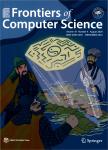Evolvable dialogue state tracking for statistical dialogue management
Evolvable dialogue state tracking for statistical dialogue management作者机构:Key Laboratory of Shanghai Education Commission for Intelligent Interaction and Cognitive EngineeringSpeechLab Department of Computer Science and Engineering Shanghai Jiao Tong University Shanghai 200240 China Department of Computer Science Cornell University Ithaca NY 14853 USA
出 版 物:《Frontiers of Computer Science》 (中国计算机科学前沿(英文版))
年 卷 期:2016年第10卷第2期
页 面:201-215页
核心收录:
学科分类:081203[工学-计算机应用技术] 08[工学] 0835[工学-软件工程] 0825[工学-航空宇航科学与技术] 0812[工学-计算机科学与技术(可授工学、理学学位)]
基 金:国家自然科学基金 the Program for Professor of Special Appointment (Eastern Scholar) at Shanghai Institutions of Higher Learning the Interdisciplinary Program of Shanghai Jiao Tong University, China
主 题:dialogue management domain extension,evolvable dialogue state tracking parser tracker
摘 要:Statistical dialogue management is the core of cognitive spoken dialogue systems (SDS) and has attracted great research interest. In recent years, SDS with the ability of evolution is of particular interest and becomes the cuttingedge of SDS research. Dialogue state tracking (DST) is a process to estimate the distribution of the dialogue states at each dialogue turn, given the previous interaction history. It plays an important role in statistical dialogue management. To provide a common testbed for advancing the research of DST, international DST challenges (DSTC) have been organised and well-attended by major SDS groups in the world. This paper reviews recent progresses on rule-based and statistical approaches during the challenges. In particular, this paper is focused on evolvable DST approaches for dialogue domain extension. The two primary aspects for evolution, semantic parsing and tracker, are discussed. Semantic enhancement and a DST framework which bridges rule-based and statistical models are introduced in detail. By effectively incorporating prior knowledge of dialogue state transition and the ability of being data-driven, the new framework supports reliable domain extension with little data and can continuously improve with more data available. This makes it excellent candidate for DST evolution. Experiments show that the evolvable DST approaches can achieve the state-of-the-art performance and outperform all previously submitted trackers in the third DSTC.



